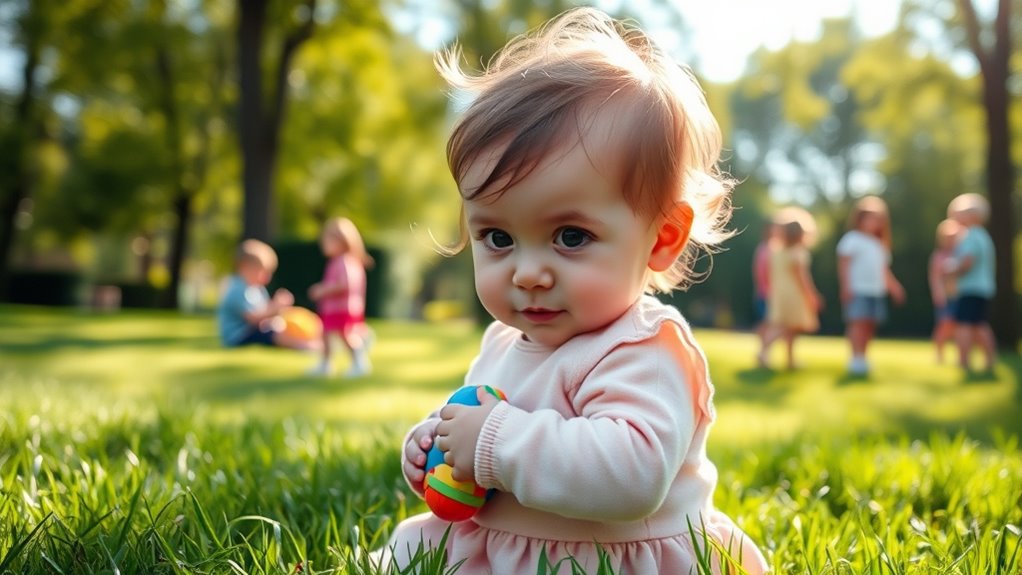To help shy toddlers build social skills, start with small, familiar playdates where they feel safe, and stay nearby without rushing them. Praise their efforts and encourage simple compliments like “Nice sharing!” through role-playing at home. Gradually increase social interactions as they gain confidence, and use visual tools to guide them. Patience and consistency are key. If you keep supporting these gentle strategies, you’ll find more effective ways to nurture their social growth.
Key Takeaways
- Keep playdates small and familiar, and stay nearby to support shy toddlers without overwhelming them.
- Gradually increase social interactions with praise for efforts to build confidence.
- Teach simple compliments to encourage positive peer interactions, using role-play at home.
- Use visual cue cards and tools to help toddlers navigate social situations confidently.
- Celebrate small social successes to reinforce progress and foster a positive attitude toward socializing.

Are you wondering how to help your shy toddler develop social skills? It can feel challenging when your little one hesitates to engage with other children, but with the right approach, you can make a difference. One effective way is to plan thoughtful playdate strategies that gently encourage your child to interact. Keep playdates small and familiar at first, inviting just one or two peers to reduce any overwhelming feelings. Choose environments where your toddler feels safe and comfortable, like your backyard or a quiet park corner. During these playdates, stay nearby so your child knows you’re there for support, but avoid rushing to intervene. Instead, observe how your toddler responds and step in only if needed. Over time, these small, manageable playdates will help build your child’s confidence and social comfort.
Another key aspect is teaching your child the importance of complimenting peers. This simple act can boost your toddler’s social skills by fostering positive interactions. Encourage your child to notice when a peer shares toys or says something funny and then to give a genuine compliment, like “Nice sharing!” or “You’re good at drawing.” Practice this at home by role-playing scenarios where your toddler can practice complimenting. When your child starts to compliment peers during playdates, it not only helps them feel more connected but also teaches kindness and empathy. Complimenting peers creates a positive feedback loop, making social interactions more enjoyable and less intimidating for shy children.
Incorporate these strategies consistently, and you’ll likely see your toddler gradually become more comfortable around other kids. Praise their efforts, no matter how small, to reinforce their progress. Celebrate moments when they initiate contact or offer a compliment, recognizing their bravery and growth. Remember, developing social skills is a process that takes patience and gentle encouragement. By creating safe opportunities for interaction with thoughtful playdate strategies and encouraging positive social behaviors like complimenting peers, you’re helping your shy toddler build the foundation for confident social interactions in the future. Additionally, introducing portable social skills tools such as visual cue cards can further support your child’s ability to navigate social situations. Over time, your child will learn that socializing can be fun and rewarding, not stressful or scary. Your support and understanding play a crucial role in guiding them through this important developmental stage, setting the stage for healthier, happier social experiences ahead.
Frequently Asked Questions
How Can Parents Support Shy Toddlers Without Pressuring Them?
You can support your shy toddler by offering gentle encouragement without pressuring them. Create a safe environment where they feel comfortable exploring social interactions at their own pace. Encourage peer play in small, familiar settings, which helps build confidence gradually. Celebrate their efforts, not just their successes, and respect their feelings. Over time, this gentle approach helps your child develop social skills naturally, fostering trust and independence without overwhelming them.
Are There Specific Toys That Encourage Social Interaction?
Imagine a colorful playroom filled with interactive dolls and building blocks that beckon your child to join in. These toys encourage social interaction by inviting your toddler to role-play, share, and collaborate. Interactive dolls foster empathy and conversation, while building blocks promote teamwork and communication. By engaging with these toys, your shy toddler gradually gains confidence, making social skills a fun and natural part of their playtime.
When Should I Consider Professional Help for My Child’s Shyness?
You should consider professional help if your child’s shyness persists beyond typical developmental milestones or if childhood anxiety seems to interfere with daily activities. If they avoid social interactions, show excessive fear, or struggle with separation anxiety, a child therapist can provide guidance. Early intervention can ease their anxiety, boost confidence, and support healthy social development, ensuring they don’t fall behind in key emotional and social milestones.
How Does Shyness in Toddlers Relate to Later Social Skills?
Shyness in toddlers often influences their early social development, shaping how they interact with others as they grow. While it can be linked to their temperament and behavior, it doesn’t determine their future social skills. If your child’s shyness persists or hinders participation, encouraging gentle social opportunities can help. Remember, with patience and support, shy toddlers can develop strong social skills over time, boosting their confidence and ability to connect.
Can Dietary Changes Influence Social Confidence in Shy Toddlers?
Dietary interventions can directly impact your shy toddler’s social confidence by boosting their brain power and mood. Nutritional impact from balanced diets rich in omega-3s, vitamins, and minerals can foster feelings of happiness and help reduce anxiety. When you choose nutritious foods, you support their development, making it easier for shy children to engage and interact. Small dietary changes can create significant strides in building social skills and confidence.
Conclusion
By gently encouraging your shy toddler to interact, you help build their confidence over time. For example, you might invite a small group of peers for a playdate, guiding your child to share toys or join in activities. Remember, patience is key—each small step counts. With your support, your child can develop social skills that will serve them well as they grow, turning shy moments into confident interactions.









